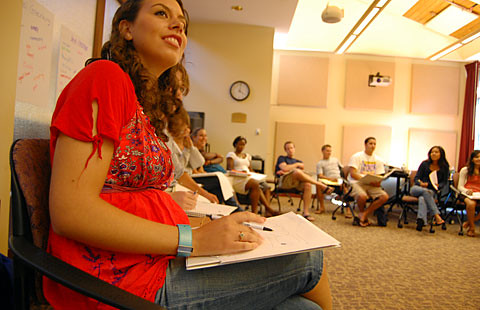(Editor’s Note: This article was written by John E. Greenfield ’10)

More than 125 students who had returned early to campus for a comprehensive leadership-training program will now apply what they learned in an attempt to not only improve their own organizations but the entire campus.
Funded by Robert A. Fox ’59, the annual has provided students with a venue in which to grow since 2005, using the Social Change Model of Leadership Development.
The three-day institute held last week was the culmination of months of planning by a steering committee of administrators, chaired by Julie DiTrapano, interim director of the Center for Leadership and Student Involvement. Eugene Riordan ’11 also put in countless hours of work as the institute’s intern.
This year, attendees represented Greek organizations, Career Services, the Office of Admission, COVE (Center for Outreach, Volunteerism, and Education), Link staff, student government, and residential life staff.
 |
| Allyson Poulos ’11 works with other students and staff members who attended the three-day Leadership Institute. (Photo by Dawn LaFrance) |
Due to strong demand, a competitive application process was added to allow other interested students an opportunity to attend.
Under the guidance of a staff facilitator and a co-facilitator, students worked in teams of 12 to 15 members. The co-facilitators were students who had previously attended the institute and had volunteered their time to receive two days of training in preparation for this year’s event.
Each team was charged with identifying and addressing a public issue at ¸Ô±ľĘÓƵ. Nearly every aspect of student life was covered in some regard, from alcohol consumption and alternative programming, to energy efficiency and environmentalism, to mentoring and identity issues.
“The small groups allowed us as students to connect on a deeper level and gain a greater understanding of all of the different opportunities that ¸Ô±ľĘÓƵ offers in a way that was informative, but also open to constructive criticism to make our campus and its groups the best that they can be,” said Hannah Feldman ’10.
During the final day, each team prepared an executive summary of its initiative, to be reviewed by campus stakeholders over the coming weeks. In addition, the teams created display boards and short presentations to showcase their work to the rest of the institute.
If past institutes are any indication, students should expect to see some of the proposals come to fruition during their time at ¸Ô±ľĘÓƵ. The recently revitalized Donavon’s Pub, for example, was partly spurred by the work of a past Leadership Institute team.